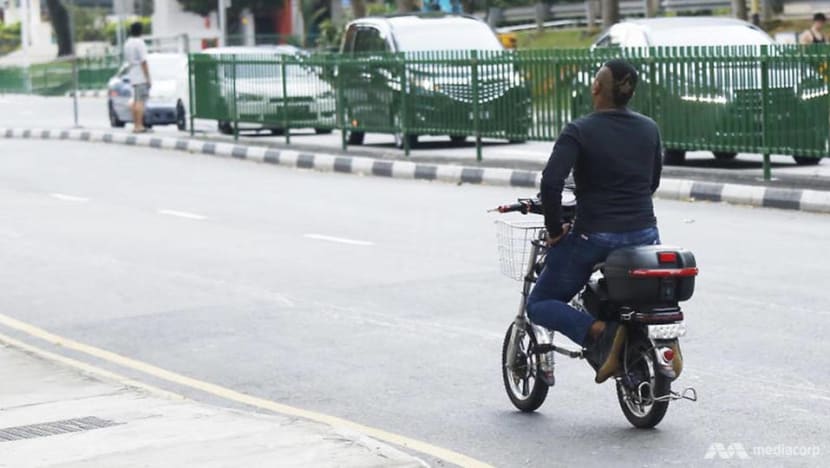Electric bicycle riders must pass theory test to ride on roads under proposed changes to Road Traffic Act

An e-bike rider on a road in Singapore. (File photo: TODAY)
SINGAPORE: Power-assisted bicycle riders will be required to pass a theory test that covers road safety before being allowed on the roads as part of proposed amendments to the Road Traffic Act (RTA) introduced in Parliament on Monday (Apr 5).
The changes are aimed at making the roads safer, the Ministry of Home Affairs (MHA) said in a statement on Monday.
This test is the same theory test that power-assisted bicycle riders will soon have to pass under the recently amended Active Mobility Act. It already has modules on road and path safety.
In March, the Government announced in Parliament that these tests will begin in the middle of 2021, while a test handbook will be released in April.
READ: E-scooter users will have to pass theory test, be at least 16 years old to ride on cycling paths
The amendment to the RTA was introduced as power-assisted bicycles are also allowed on roads, MHA said.
With that said, power-assisted bicycle users will only have to pass a single theory test. The Land Transport Authority will be the sole digital touchpoint for these tests.
“The single theory test will cover modules on both path and road safety to ensure that riders are aware of active mobility rules, the code of conduct and safe riding behaviour,” MHA said.
Riders must meet the same criteria before taking the test, including being at least 16 years old and paying a single test fee. The test result is valid for life except in cases of misrepresentation or fraud.
WATCH: Baey Yam Keng on theory test for e-scooter, power-assisted bicycle riders
MHA will also create the offences of riding a power-assisted bicycle on the roads without passing the theory test, and employing a person who has not passed the test to ride a power-assisted bicycle on the roads.
The latter offence covers companies that intentionally or negligently engage the services of food delivery workers who have not passed the theory test. This includes workers who are not employed by them.
Penalties for the offences will be aligned to those in the Active Mobility Act.
First-time offenders could be jailed for up to six months and/or fined a maximum of S$2,000. Repeat offenders could be jailed for up to a year and/or fined a maximum of S$5,000.
READ: Stiffer measures proposed for illegal racing, road rage and pretending to be offending driver
NEW MOTORCYCLE HELMET-RELATED OFFENCE
As part of the amendments, motorcyclists could be fined and jailed for not ensuring their pillion rider wears a helmet, a key safety feature.
MHA will also increase penalties for the importing or selling of non-approved helmets to align with that of other helmet-related offences.
READ: 71-year-old motorcyclist dies after hit-and-run crash with car along New Upper Changi Road
These changes come as motorcyclists and pillion riders form a large proportion of traffic deaths over the past few years.
Motorcyclist and pillion rider deaths made up 40 per cent of the 85 traffic deaths last year. The remaining cases comprised pedestrian, driver and cyclist deaths.
The new offence of failing to ensure a pillion rider wears a helmet will carry penalties similar to the existing offence of motorcyclists or pillion riders not wearing a helmet.
First-time offenders could be jailed for up to three months and/or fined a maximum of S$1,000. Repeat offenders could be jailed for up to six months and/or fined a maximum of S$2,000.
For the offence of importing or selling unapproved helmets, MHA proposed to raise the maximum fine to S$1,000 for first-time offenders and S$2,000 for repeat offenders.
Under the current law, first-time offenders could be jailed for up to three months and/or fined up to S$500. Repeat offenders could be jailed for up to six months and/or fined up to S$1,000.














